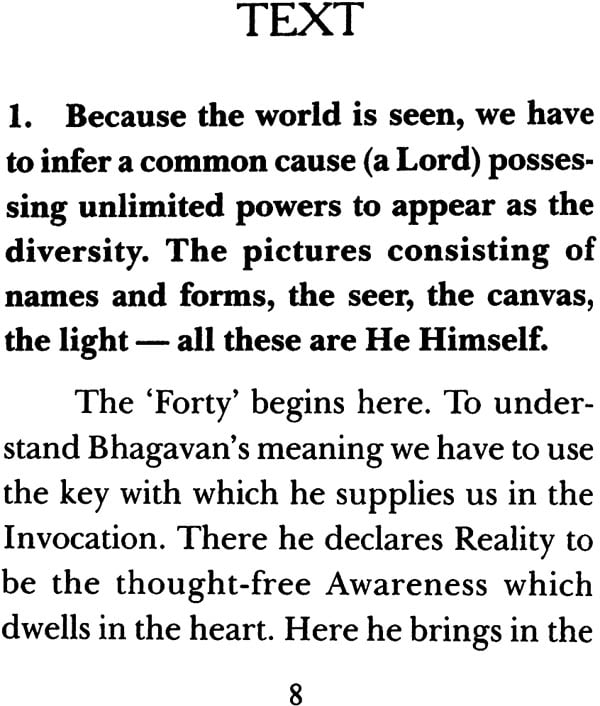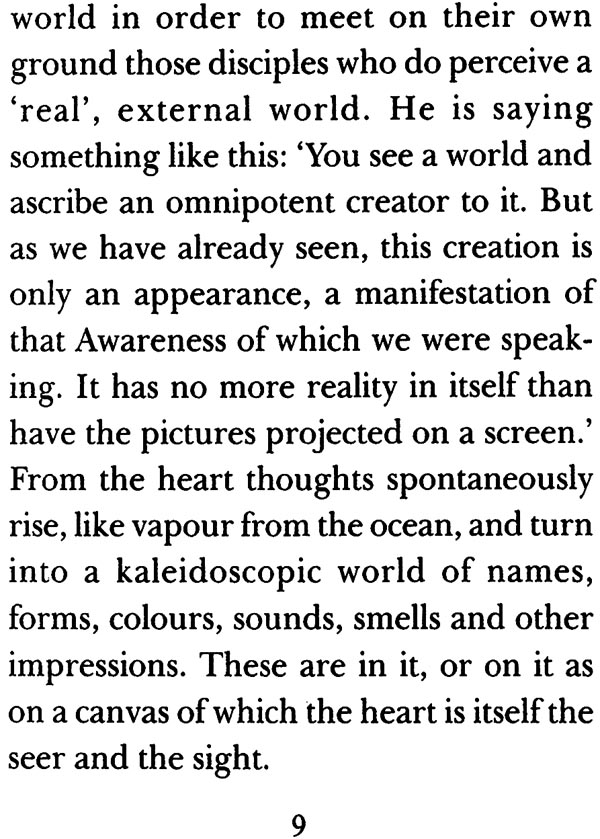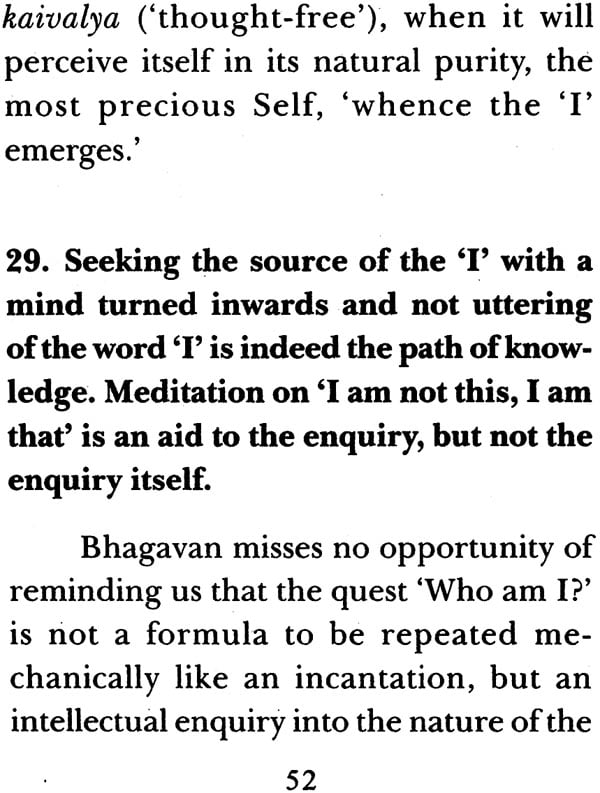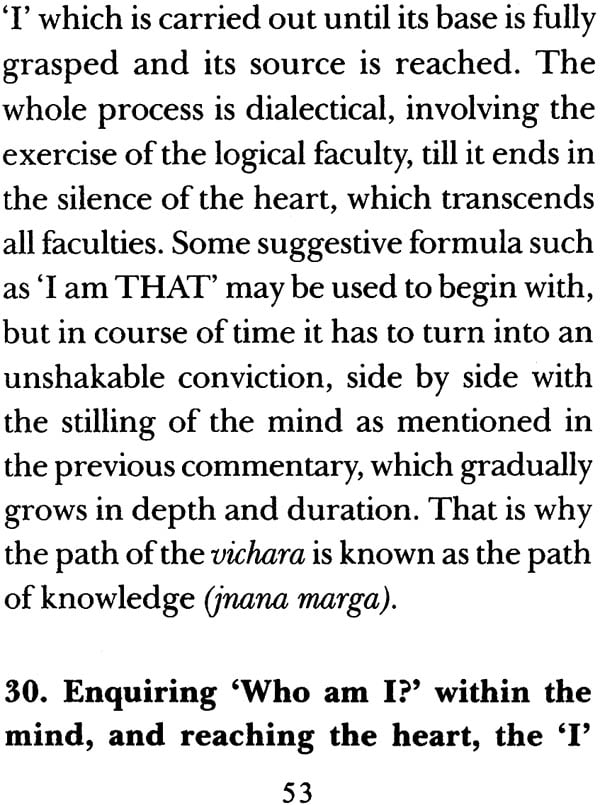
Forty Verses on Reality by Ramana Maharshi
Book Specification
| Item Code: | NAC142 |
| Author: | S.S.Cohen |
| Publisher: | Sri Ramanasramam, Tamil Nadu |
| Edition: | 2021 |
| ISBN: | 9788188018475 |
| Pages: | 91 |
| Cover: | Paperback |
| Other Details | 5.4 Inch X 4.3 Inch |
| Weight | 50 gm |
Book Description
S.S. Cohen arrived at Ramana Maharshi’s Ashram in 1936. With a keen intellect and burning aspiration he immediately grasped the import of the Master’s teachings, experienced His gracious response and dedicated the rest of his long life to the Self-radiant experience of Truth.
In Forty Verse, S.S. Cohen turns the spot light of his sharp intellect and spiritual maturity in the direction of the Master’s quintessential work, Ulladu Narpadu, Forty Verses on Reality, and illumines these teachings with directness and simplicity.
It was not without much hesitation that l acceded to the suggestion of one or two of my friends to prepare a simplified translation of Sri Bhagavan’s ULIADU NARPADU, or Forty Verse on Reality, which newcomers to Sri Ramanasram, especially the English-speaking foreigners who come in increasing numbers, might more easily understand.
It is generally admitted that Sri Bhagavan’s ideas are often beyond the reach of the common reader and the beginner. They are made more difficult by his Tamil mode of expression and by the spontaneity with which he wrote the individual verses, for it was not his intention t0 produce a compact philosophical system or thesis. He wrote the verses as they occurred to him, and they were later arranged by a disciple in the order in which we see them in print.
When undertaking this venture I placed before me six different English translations, chose the versions common to the majority of them, and wrote these clown in almost conversational English. I avoided technical terms and difficult words so far as this could be done, while remaining faithful to the original. When I had a doubt due to lack of agreement between the different translators, I sought the help of Tamil scholars in Vellore.
I also wrote brief notes on each verse, developing the verse’s main points so that in some places the notes read like a paraphrase, but without learned quotations or long dissertations. For all that the seekers (sadhakas) need and want is to understand the spirit of Bhagavan’s utterances and apply it in their spiritual practice (sadhana).
In these forty verses, as the reader will observe, Bhagavan has touched on all the salient points of his teaching, constantly stressing the great value and efficacy of the we/mm, or investigation into the nature of the investigator himself All the Masters of the Upanishads maintain that man is not the elements out of which his body is made, but “tl1e mind, or intelligent principle, or being, which uses the body’. That is the serene, blissful Self, the absolute, second less Reality, which all are seeking consciously and unconsciously in different ways — devious or straight, wrong or right — and of which the sadhaka endeavours to have a direct and full Knowledge.
The synopsis which follows not only gives the gist of every verse, but is also intended to help the reader to locate a specific subject. It takes the place of an index, which seems out of place in a small work like this.
Content
| Invocation | ||
| i. | Awareness is the nature of Reality. | 1 |
| ii. | Fear of death is the driving force behind the quest for immortality. | 6 |
| The Text | ||
| 1. | Awareness is all – the seer and seen, the real and apparent. | 8 |
| 2. | The triad — God, soul and world — is the creation of the ego and disappears with the ego. | 10 |
| 3. | Speculations about God and world avail nothing: Self realization is the hearts cry of all. | 11 |
| 4. | Form and formlessness of God depend on the ego’s conception of itself. | 12 |
| 5. | The world is the body inclusive of the live sheaths, for without them the world cannot be conceived (or perceived). | 14 |
| 6. | The world is what the mind conceives through the senses. | 17 |
| 7. | The world rises and sets with the knowledge of it. Both have their source in the Self. | 19 |
| 8. | Any sincere worship eventually leads to Realization. | 20 |
| 9. | The dyads and triads are supported by the One, which can be discovered by enquiry. | 21 |
| 10. | Knowledge and ignorance are interrelated. Real knowledge arises by enquiring for whom both knowledge and ignorance occur. | 22 |
| 11. | Not to seek the Self which is the source of both knowledge and ignorance is real ignorance. | 24 |
| 12. | Tine knowledge is self-effulgent: it is neither knowledge nor ignorance. | 25 |
| 13. | Knowledge of diversity is ignorance, yet it is not apart from the Self, like the shapes of ornaments which are not apart from the gold. | 26 |
| 14. | ‘You’ and he’ exist when the ‘I’ exists. If the root of the ‘I’ — the One — is found, ‘You and ‘he’ will also shine as the One | 28 |
| 15. | Past and future are only the present when they occur, thus the present alone exists. | 29 |
| 16. | Time and space do not exist apart from the Self | 30 |
| 17. | To those who have not realized, the ‘I’ is of the size of the body. To those who have, it is limitless. | 33. |
| 18. | To those who have not realized, the world is confined to the space it occupies. lo those who have, it is the limitless substratum of the world. | 34 |
| 19. | Arguments about destiny and free-will are carried on by those who have not realized. Those who have, are free from both. | 36 |
| 20. | Seeing the Self is seeing God, so the Self is not other than God. | 39 |
| 21. | To see God is to he absorbed by God. | 41 |
| 22. | God shines in the mind. But to know God the mind has to turn inward. | 43 |
| 23. | Although the world disappears with the ‘I’, the ‘I’ continues to exist in sleep as in waking. | 44 |
| 24. | Neither the body nor the self says ‘I’: between them the ego rises and ties them together. | 45 |
| 25. | The ego takes a body and accomplishes various acts. It takes one body after another till it is destroyed by vichara. | 46 |
| 26. | The ego being the all, surrendering it is surrendering all. | 48 |
| 27. | To destroy the ego the source of its emergence has to be sought and retained as the real state | 49 |
| 28. | The seeking has to be deep within one-self, like diving to recover a precious object that has fallen in deep waters. | 50 |
| 29. | The vichara is not muttering ‘I’, but sinking the mind into its source. | 52 |
| 30. | On reaching the heart, the ‘I’ subsides and the real ‘I-I’ manifests in its place. | 53 |
| 31. | Having extinguished the ego the jnani has no other purpose in life but to remain immersed in the bliss of the self. | 55 |
| 32. | Although ‘Thou art That’, say the Vedas, not to investigate into one’s nature and ‘abide as That’ is mental weakness. | 57 |
| 33. | Self-knowledge is not duality: the self being single, it is itself both the objects as well as the subject. | 58 |
| 34. | Disputing the nature of the self without attempting self-realization merely constitutes delusion. | 60 |
| 35. | Thaumaturgic powers are like dream-magic – they do not entrap the self-realized. | 61 |
| 36. | It is not necessary to go on meditating ‘I am That’, for one always is That. | 64 |
| 37. | Non-duality prevails always, whether as the world or as the self. | 66 |
| 38. | The sense of doer ship reaps the fruits of action (karma): karma ends when the doer realizes his true nature. | 68 |
| 39. | Bondage and Liberation are mere notions in the mind: they cease when he who is bound is enquired into and realized. | 73 |
| 40. | True Liberation has no form, and destroys the very ego which distinguishes between one kind of it and another. | 74 |
Sample Pages









